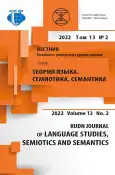Psycholinguistic description of the associative field MEDICINE in the linguistic consciousness of Russian and Chinese speakers
- Authors: Wei X.1, Liu L.1, Wu P.2
-
Affiliations:
- Guangdong University of Foreign Studies
- Shandong Women’s University
- Issue: Vol 13, No 2 (2022)
- Pages: 554-566
- Section: COMPARATIVE STUDIES
- URL: https://journal-vniispk.ru/2313-2299/article/view/323513
- DOI: https://doi.org/10.22363/2313-2299-2022-13-2-554-566
- ID: 323513
Cite item
Full Text
Abstract
-
About the authors
Xiao Wei
Guangdong University of Foreign Studies
Email: grace-wei@yandex.ru
ORCID iD: 0000-0002-3524-9020
PhD in Philology, Senior Lecturer, Department of the Russian language Faculty of European Languages & Cultures
2 Baiyun Blvd N, Baiyun, Guangzhou, Guangdong Province, China, 510420Lifen Liu
Guangdong University of Foreign Studies
Email: liulifen1993@163.com
ORCID iD: 0000-0002-0003-0723
Doctor of Philology, Professor, Department of the Russian language, Center for Translation Studies and Faculty of European Languages & Cultures
2 Baiyun Blvd N, Baiyun, Guangzhou, Guangdong Province, China, 510420Peihua Wu
Shandong Women’s University
Author for correspondence.
Email: 1320236988@qq.com
ORCID iD: 0000-0001-7406-7046
PhD in Philology, Senior Lecturer, Department of the Russian language, University of the Foreign languages
2399, Daxue Road, Shizhong District, Jinan, Shandong, China, 250300References
- Lazareva, O.V. (2021). Language Personality: Results and Prospects of the Study. RUDN Journal of Language Studies, Semiotics and Semantics, 12(2), 229–237. https://doi.org/10.22363/2313-2299-2021-12-2-229-237. (In Russ.).
- Vinogradova, O.E. (2016). Comparative analysis of the methods of experimental study of the semantics of the word. In: Comparative studies. Iss. 13. Voronezh: Istoki. pp. 7–13. (In Russ.).
- Zalevskaya, A.A. (1991). Some current trends in the psycholinguistic study of vocabulary. Problems of Semantics: Psycholinguistic Studies. Tver. (In Russ.).
- Shchur, G.S. (1986). On the types of lexical associations in the language. In: Semantic structure of the word: psychological research. Moscow: Nauka. (In Russ.).
- Ufimtseva, N.V. (2000). Linguistic consciousness and the image of the world of the Slavs. In: Linguistic consciousness and the image of the world. Moscow: Institute of Linguistics RAS. pp. 207–219. (In Russ.).
- Teliya, V.N. (1971). The connotative aspect of the semantics of nominative units. Moscow: Nauka. pp. 140–151. (In Russ.).
- Safaralieva, L.A. (2021). Evolution of the Associative-Verbal Network of the Concept “Old Age” in the Language Consciousness of the Native Russian-Language Speakers of the 20s of the XXI Century. RUDN Journal of Language Studies, Semiotics and Semantics, 12(4), 1147-1159. https://doi.org/10.22363/2313-2299-2021-12-4-1147-1159 (In Russ.).
- Dmitriyeva, N.M. & Chulkina, N.L. (2022). The transformed semantics of the verbalizers of the ethical concepts “Love” — “Mercy” — “Chastity” — “Virtue”. Russian Language Studies, 20(1), 52–67. https://doi.org/10.22363/2618-8163-2022-20-1-52-67 (In Russ.).
- Wang, Ch. (2012). Experimental study of associative units of Chinese speakers. Moscow University Philology Bulletin, 4, 108–118. (In Russ.).
- Kolysheva, O.N. (2021). War in the Young Russians Language Consciousness: An Associative Experiment. RUDN Journal of Language Studies, Semiotics and Semantics, 12(2), 339–358. https://doi.org/10.22363/2313-2299-2021-12-2-339-358 (In Russ.).
- Sibul, V. (2017). Psycholinguistic analysis of lexical-semantic structure in linguistic consciousness of Russian, English and German native speakers. Training, Language and Culture, 1(2), 54–70. https://doi.org/10.29366/2017tlc.1.2.4
- Tikhonova, E.V. (2013). A psycholinguistic description of the congruence of the associative field PARENTS in the language consciousness of the Russian and the Chinese. Magister Dixit, (2), 193–202. (In Russ.).
- Shaklein, V.M. & Scomarovscaia, A.A. (2021). Peculiarities of Greek Origin Words Perception by the Representatives of Contemporary Russian Linguistic Culture: Associative Experiment. RUDN Journal of Language Studies, Semiotics and Semantics, 12(4), 1036–1050. https://doi.org/10.22363/2313-2299-2021-12-4-1036-1050 (In Russ.).
- Kharchenko, E.V. & Jin, Zhi (2018). The Image of the Child in Language Consciousness of Native Speakers of Chinese and Russian Linguocultures (a Case Study of Associate Experiment Data). Journal of Psycholinguistics, 3(37), 82–92. (In Russ.).
- Isajeva, E.S. & Vasiljeva, E.G. (2021). Associative field of the concept “fire” in the linguistic consciousness of native Russian speakers at the background of the Latvian linguistic culture. Russian Language Studies, 19(3), 241–252. https://doi.org/10.22363/2618-81632021-19-3-241-252 (In Russ.).
- Tarasov, E.F. (2003). Intercultural communication — a new ontology for the analysis of linguistic consciousness. In: Ethnocultural specifics of linguistic consciousness. Collection of articles, N.V. Ufimtsevf (Ed.). Moscow. (In Russ.).
- Krasnykh, V.V. (2001). Fundamentals of psycholinguistics and communication theory. Moscow. (In Russ.).
- Karaulov, Yu.N. (1994). Russian Associative Dictionary as a New Linguistic Source of a Tool for Analyzing Language Ability. In: Russian Associative Dictionary, Yu.N. Karaulov, Yu.A. Sorokin, G.A. Cherkasova, N.V. Ufimtseva, E.F. Tarasov (eds.). Moscow: Pomovsky and partners. Bk. 1. pp. 191–218. (In Russ.).
- Leontiev, A.A. (2005). Fundamentals of psycholinguistics. Moscow. (In Russ.).
- Associative experiments and online dictionaries. URL: http://tesaurus.ru/dict/ (date of access: 04/04/2021).
- Cherkasova, G.A. (2008). Russian comparative associative dictionary. Moscow. URL: http://itclaim.ru/Projects/ASIS/RSPAS/zapusk.htm (accessed: 04/04/2021). (In Russ.).
- Karaulov, Yu.N., Cherkasova, G.A., Ufimtseva, N.V., Sorokin, Yu.A. & Tarasov E.F. (2002). Russian Associative Dictionary. Moscow: Astrel. URL: http://tesaurus.ru/dict/ dict.php (accessed: 04.04.2021). (In Russ.).
Supplementary files









